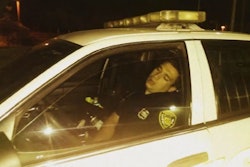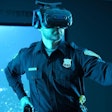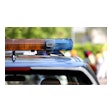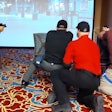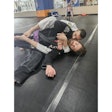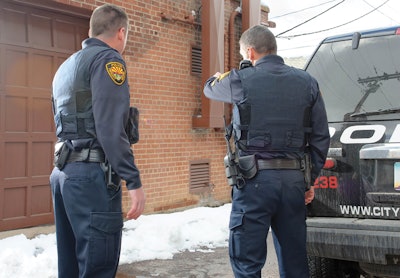 Photo by Mark W. Clark.
Photo by Mark W. Clark.
Of course, your job description details all of your command duties, including budgets, direction over programs, working with city/county staff, building community trust, and so forth. But if you want to get real about what your duties really are then read on.
You are a chief or sheriff. Your title in itself states that you are a law enforcement officer, and you should never ever forget it. It is your job to lead some of the bravest and most deserving men and women assembled. They often take risks to protect others, each other, and make your agency productive. They put it all on the line for you and the public.
In your job description are two key roles that don't get enough attention: overseeing officer safety and defensive tactics training. Let me remind those of you who scoff at this that you are the one to meet with a family member at the hospital when an officer is injured. You are the one who has to meet with the family if the worst happens. And you are the one who has to answer a spouse or parent who asks: "Did you do everything you could have done to prevent this?"
Before you find yourself in this terrible situation, answer this question for yourself: What have you done recently to make your officers safer?
Join the Training
The answer can only be found in your responses to even more questions.
How do you view your department's training, especially defensive tactics and officer survival training? Do you consider it an inconvenience to scheduling officers for duty? Do you consider it mandatory (I hate that word)? Do you do all you can to reschedule around it? Do you and your command staff attend with the rank and file or do you request an executive overview or private command-only sessions?
That last question is critically important. And I have this advice to offer you: Get real and train with your officers.
You should be one of the first enrolled in your defensive tactics and subject control training classes. Your attendance and participation will speak to all, and what it will say is this stuff is real and it's important. Your absence and lack of support will make it seem like you don't care.
Your attendance at training sessions also provides you with valuable input regarding the class and your fellow students. Do not avoid coffee break interactions; they will give you informal feedback that you may or may not want.
I recall several times where a senior staffer was partnered up with a rookie during defensive tactics training. It was a little awkward at first but then the interactions flowed. This is an opportunity for you to hear the feedback of the front-line users whether or not what is taught and/or issued is working.
Another reason you should attend is to fully understand what is being taught. I remember a story about a commander who had prided himself in avoiding the new defensive tactics system certification that was being taught, he was then assigned to Internal Affairs. Then there was a complaint on a use-of-force arrest and the new system was used. Ignorant of the training, this IA commander surmised that the use of force was out of policy and that heads needed to roll.
However, after the new system was explained by a trainer, he decided that everything was within policy. Could this have gotten out of hand if not for the trainer? In this case, no for the chief himself was certified and would have caught it. But the point is that you and your staff need to know more than anyone on how to defend the officers and protect them civilly, and that's a very good reason for you to participate in your agency's use-of-force training.
Connect with Trainers
It's also a very good reason for you to spend some time talking with your trainers. Some of the most important staff members on your department are your trainers. These are the men and women who take your policies, procedures, and guidelines and put a human face to them and breathe life into them. Orders are nothing but ink on paper, trainers put them into motion.
Treat your trainers with respect; they can make or break any officer safety initiative you want to achieve. They can put excitement into them or read them and say: "This is what the 'old man' or 'old lady' wants, and if you don't do it, you will be written up."
I know it sounds like I'm saying trainers promote your policy, but there's more to it. Good, motivated trainers take ownership of training. They possess the ability to make you and your programs successful or marginal.
Talk with and listen to your trainers. They have the knowledge, skills, and abilities to size up your officers better than you ever will. Your trainers know their problem students, the ones with limitations, the ones who have difficulties on the range, and those who don't seem to care. They also know the departmental needs that have to be delivered such as seeking reaccreditation or maintaining certain professional standards.
Why do your troops talk to their trainers and not the command staff? Maybe it's because the trainers are there. They are available to listen to your officers and help them to improve their skill sets.
Go to Conferences
Chiefs need to review officer safety with a zest and zeal. You want to do everything you can to keep your officers safe because that is your moral duty. You also want to keep them safe because injuries are expensive and they strain resources. Smart officer safety policies and effective defensive tactics training will yield fewer duty claims, fewer insurance claims, fewer civil claims (smart use of force avoids troubles), and fewer civilian complaints.
Whenever you attend a conference, you are attracted to your interests and most vendors at chief and sheriff conferences focus on the fleets, computer systems and strangely enough all big ticket items. What is usually missing from the vendors areas are the defensive tactics and officer safety systems and implements. So how can you get the latest and best equipment to the officers?
Your training staff should be members of and attend the professional conferences of one or more of the professional training organizations. These are also open to chiefs and sheriffs and welcome your attendance as well.
I would recommend you visit the websites for the International Law Enforcement Trainers and Educators, the International Association of Law Enforcement Firearms Instructors, the National Tactical Officers Association and see if your state has state training organizations.
The networking of instructors offered by these organizations will be a bonus to your officer safety and tactics plans. Bringing the synergy of national organizations to your department's training will be a bonus, find the budget money for your staff to attend these conferences.
When it comes to defensive tactics, answer a few questions here. Do you recall what it was like to have to tussle with a non-compliant drunk on his front porch on a domestic call?
The reason I bring this up is a recent conversation I had with a new chief. He was disgusted with his department's use-of-force statistics. "Why can't they just reason with the arrestees?" he asked. During the conversation I asked about his background. He had never, ever been a street cop in his career. He started in administration, transferred around and now is a chief, he even has a uniform now to prove it.
This is not a walk in my shoes story but we all need to recall what our officers are facing today. Recall your scrapes and bruises and pass on the support and knowledge to your officers so they have higher survivability and better safety.
Defensive tactics is not a pretty subject to most administrators, nor is your departmental firearm training. However, this training is critical to officer safety. And I will take it one step further, I believe they should be merged into one training event "subject control."
To me as an old trainer, it is senseless to schedule classes for DT training and then the next month schedule for firearms. There are ways to combine the two in some instances (not all); your training unit can help you with this. Wasting training time and budget is a sin; capitalize on your training time. It enhances the skills, makes it more real for the officers, and you may save some lives and even some money.
As chiefs and sheriffs, you must take a close look at officer safety and defensive tactics. I fully understand your plates are already full but this is an essential area of concern and the investment of your time will pay off dividends. There can be some administrative and fiscal improvements here, but the value on an officer's life or his or her quality of life post-incident is worth your time invested.
The value of your staff's morale and well-being is also an investment. Their knowing that their top cop has got their back not as an administrator but as a real cop is priceless. Go be the chief you need to be for your officers, it's worth the investment.
William "Bill" Harvey has served since 2002 as a chief of police in south central Pennsylvania. He retired from the Savannah (Ga.) Police Department where he worked assignments in training, patrol, and CID. Harvey has more than 40 years of experience in public safety and law enforcement.









